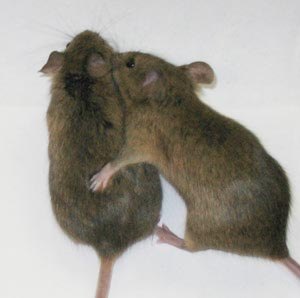![]() How many times have you heard a guy say "Women - can't live with them, can't live without them." Well, they just might be onto something. At least kind of. You see, living with a woman might just make you fertile longer. New research published in Biology of Reproduction has found that male mice stay reproductively active longer if they live with a female mouse than if they live alone.
How many times have you heard a guy say "Women - can't live with them, can't live without them." Well, they just might be onto something. At least kind of. You see, living with a woman might just make you fertile longer. New research published in Biology of Reproduction has found that male mice stay reproductively active longer if they live with a female mouse than if they live alone.
 The study, from the University of Pennsylvania School of Veterinary Medicine, sought to see whether living with a female mouse had any affect on a male mouse's fertility as he aged. To do this, male mice were either housed with a female mouse continuously or isolated, given access to a virgin female only at given time intervals to prove fertility (sounds terrible to you guys, I'm sure). They also looked into factors of fertility like testes size and abnormal spermatogenesis at each time point.
The study, from the University of Pennsylvania School of Veterinary Medicine, sought to see whether living with a female mouse had any affect on a male mouse's fertility as he aged. To do this, male mice were either housed with a female mouse continuously or isolated, given access to a virgin female only at given time intervals to prove fertility (sounds terrible to you guys, I'm sure). They also looked into factors of fertility like testes size and abnormal spermatogenesis at each time point.
They found that male mice which were housed with females were fertile a whopping 20% longer than the isolated males. Also, histological abnormal spermatogenesis appeared earlier in the isolated males, giving a possible mechanism to their sooner decrease in fertility. Interestingly enough, once a mouse started to decline in fertility, the rate at which he became infertile was the same between the two treatments, suggesting that once whatever processes by which a mouse loses fertility begin, they have a set time course.
What does this mean for us? If you want to put off having kids, perhaps having a girlfriend or wife live with you throughout your 20s and 30s will let you have kids later on. Or, conversely, if you live single and alone through those years, you might have a bit more trouble impregnating someone when you're older. It also may explain why males, who some might argue evolutionarily have an advantage by staying single and ready to mingle, form long-term bonds with females. It's possible that the added reproductive benefits of living with the same woman outweigh the costs - while sleeping with different ones and staying a bachelor gets you a few more kids while you're young, the added years of fertility give you more. Albeit that's a bit of a reach (and would require a lot more support), it's possible.
Now, the astute reader would point out at this juncture that the research was in mice, not humans. True, true. But there is the possibility, at least, that this effect could be true for other mammals, including us. Perhaps the most useful application if this phenomena is in other species, however, won't be in our own mating strategies but in the livestock and other breeding industries. Housing a prize stud horse with a nice female might give him a longer reproductive lifespan, meaning a lot more cha-ching for his owner. Or keeping endangered zoo animals with opposite-sexed partners might give struggling population breeding programs an extra boost.
In any case, this new finding might just open up some interesting new studies on the effects of cohabitation on reproduction, and perhaps what pathways this might occur by. And as always, if it's about sex, I'll probably be interested in their findings. I just can't seem to pull myself away from all this reproductive biology. I don't have my mind in the gutter - I swear.
J. A. Schmidt, J. M. Oatley, R. L. Brinster (2009). Female Mice Delay Reproductive Aging in Males Biology of Reproduction DOI: 10.1095/biolreprod.108.073619
